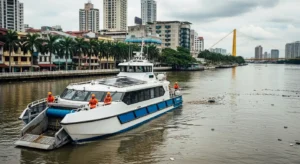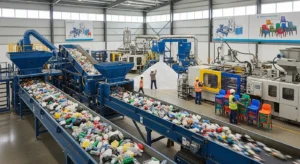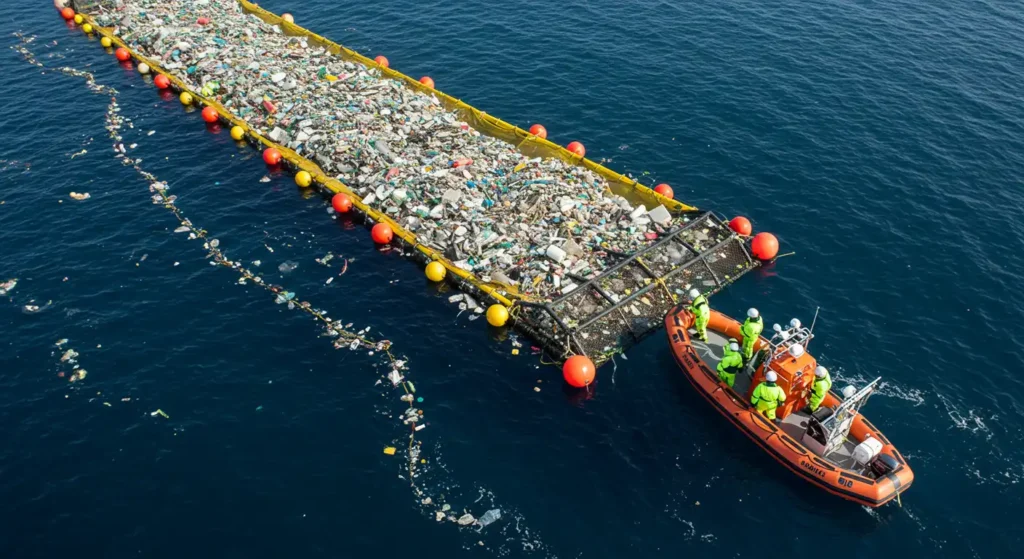Protecting Our Coast: New Ocean Cleanup Projects Making Waves is not just a slogan—it’s a mission that sits at the heart of global efforts to safeguard marine environments and coastal communities.
Ocean cleanup projects have become critical tools in addressing the mounting crisis of plastic pollution. Each year, millions of tons of plastic enter the oceans, threatening wildlife, disrupting fragile ecosystems, and harming local economies dependent on healthy seas.
Plastic debris doesn’t simply wash up on beaches; it breaks into microplastics, infiltrating food chains and water supplies. The scale of this issue demands ambitious solutions backed by both technological innovation and community mobilization.
Recent years have seen ocean cleanup projects reach new heights, driven by advancements in collection technologies and strategic international collaboration. Organizations dedicated to protecting coasts are now removing record-breaking amounts of trash from both open waters and rivers that serve as pollution highways. These efforts are dramatically reducing the flow of plastic into the oceans.
Key takeaway:
Recent advancements in ocean cleanup efforts are setting new standards for impact, significantly reducing plastic pollution and offering hope for reversing decades of environmental harm.
As these projects continue to evolve, they play a pivotal role not only in cleaning the seas but also in inspiring broader action for healthier marine environments worldwide.
The Ocean Cleanup Organization’s Achievements in 2024
The Ocean Cleanup organization is a leading force in marine conservation, dedicated to eliminating plastic pollution from the world’s oceans. Founded by Boyan Slat, this nonprofit combines innovative engineering with strategic implementation to address some of the most pressing environmental issues affecting our coastlines and open waters.
Record-Breaking Year for Plastic Pollution Removal
2024 is a significant year for the Ocean Cleanup organization. This year alone, the team removed an unprecedented 11.5 million kilograms of trash from the world’s oceans—a figure that surpasses the total collected in previous years since the group’s founding. The pace and scale of plastic recovery have accelerated dramatically, with notable achievements including:
- Surpassing 10 million kilograms extracted after six years of operation.
- Removing a cumulative 20 million kilograms of trash by November 2024.
These numbers reflect not just operational growth but a strengthened commitment to making a significant, lasting impact on global plastic pollution.
Impactful Milestones and Global Influence
Each milestone achieved sets a higher standard for what’s possible in ocean stewardship. Removing such vast amounts of waste directly reduces threats to marine life, supports healthier coastal ecosystems, and inspires similar efforts worldwide. The group’s success has also increased public awareness and pressure on governments and industries to address the root causes of ocean plastic pollution.
System 03: Revolutionizing Great Pacific Garbage Patch Cleanup
At the heart of these accomplishments is System 03, an advanced cleanup technology specifically designed for tackling large debris areas like the Great Pacific Garbage Patch. Key features include:
- A scalable, modular design that allows for continuous operation in harsh ocean conditions.
- Enhanced debris retention systems that maximize plastic capture while minimizing harm to marine wildlife.
- Real-time monitoring and adaptive controls to ensure safety and efficiency.
System 03 has set new benchmarks for cleanup effectiveness, making it possible to capture up to several tons of debris per week from one of the planet’s most polluted marine regions.
The momentum generated by these achievements drives ongoing innovation—laying the foundation for even more ambitious projects targeting river pollution sources and new coastal hotspots. As we explore methods on how to clean up all that ocean plastic, it’s clear that initiatives like those led by Ocean Cleanup are crucial in shaping a cleaner future for our oceans.
Expanding River Cleanup Efforts with Interceptor Technologies
 River cleanup initiatives play a crucial role in reducing plastic pollution that eventually makes its way into our oceans. Approximately 80% of ocean plastic pollution originates from rivers, with around 1,000 rivers contributing the majority of this riverine pollution. Addressing the issue at its source is essential for minimizing the environmental impact on marine ecosystems.
River cleanup initiatives play a crucial role in reducing plastic pollution that eventually makes its way into our oceans. Approximately 80% of ocean plastic pollution originates from rivers, with around 1,000 rivers contributing the majority of this riverine pollution. Addressing the issue at its source is essential for minimizing the environmental impact on marine ecosystems.
Interceptor technologies have emerged as a key strategy for effective river cleanups. These innovative solutions are designed to tackle plastic pollution before it reaches the ocean. The Ocean Cleanup organization has deployed these technologies globally, targeting some of the most polluted rivers, such as Bangkok’s Chao Phraya River, Guatemala’s Rio Motagua, and Jamaica’s Sandy Gully.
Operational Details and Advanced Technologies
Interceptor solutions incorporate several advanced technologies to ensure maximum efficiency and effectiveness:
- Solar-powered devices: Utilize renewable energy to operate autonomously, reducing the need for external power sources.
- Floating barriers: Positioned at river mouths to capture debris flowing downstream, preventing it from entering larger water bodies.
- Barges with conveyor belts: Equipped with systems to extract collected trash efficiently, ensuring continuous operation without manual intervention.
- Specialized barriers: Designed to prevent trash flow during rainy seasons or high water levels, ensuring consistent performance year-round.
These technologies are operated by local partners who handle sorting and recycling of collected debris. This collaboration ensures that waste is managed sustainably and recycled where possible. However, the success of these operations often hinges on government support and the collection of fees to maintain ongoing efforts.
The deployment of Interceptor technologies represents a significant advancement in river cleanup initiatives. By intercepting plastic waste at critical points along river systems, these projects help reduce the volume of pollutants that reach our oceans. This proactive approach not only protects marine environments but also supports healthier ecosystems and communities reliant on these water resources.
Innovative Approaches: Turning Plastic Debris into Products
 Turning plastic debris into valuable products is a groundbreaking approach in ocean cleanup efforts, leveraging the concept of a circular economy. By forming strategic partnerships, organizations are transforming collected plastic waste into new, useful items. For instance, collaborations with companies like Adidas and Parley for the Oceans have resulted in the creation of high-performance shoes made from ocean plastic.
Turning plastic debris into valuable products is a groundbreaking approach in ocean cleanup efforts, leveraging the concept of a circular economy. By forming strategic partnerships, organizations are transforming collected plastic waste into new, useful items. For instance, collaborations with companies like Adidas and Parley for the Oceans have resulted in the creation of high-performance shoes made from ocean plastic.
These sustainable practices not only provide a solution to plastic pollution but also generate significant economic benefits by creating marketable products from waste materials. This shift promotes job creation in recycling and manufacturing sectors and drives innovation in product design and material science. The potential for turning environmental challenges into economic opportunities is further emphasized by studies on the sustainability of such initiatives.
However, plastic pollution severely impacts the value of our ecosystem’s services. Marine ecosystems contribute up to $50 trillion annually through services such as fisheries, tourism, and coastal protection. The degradation of these ecosystems due to plastic pollution results in substantial economic losses—estimated in the hundreds of billions per year. Addressing this issue is crucial for maintaining the health and productivity of marine environments.
By adopting these innovative approaches, ocean cleanup projects are protecting our coasts and ensuring the sustainability of marine resources. These initiatives highlight the potential for fostering a more resilient and sustainable future for our oceans while simultaneously addressing pressing environmental issues.
Harnessing Global Volunteer Power: The International Coastal Cleanup Initiative
Global volunteer partnership sits at the heart of the International Coastal Cleanup (ICC) initiative. Since its beginning, ICC has brought together millions of volunteers from around the world, united by one mission: restoring coastlines and protecting marine habitats. The movement, started over three decades ago with a handful of committed individuals, now mobilizes over 18 million people—a testament to the powerful impact of collective action.
The Purpose Behind Beach Cleanups
Beach cleanups under the ICC umbrella are not just about removing visible trash. Volunteers work side by side across continents, collecting debris from shorelines that would otherwise threaten wildlife and pollute coastal waters. More than 380 million pounds of rubbish have been removed since ICC’s inception. This massive effort demonstrates how individual participation can ripple outward, creating cleaner beaches and healthier ecosystems on a global scale.
Key Aspects of ICC’s Success
Key aspects of the ICC’s success include:
- Diverse participation: School groups, families, businesses, and community organizations all contribute time and energy.
- Data-driven impact: Volunteers catalog every item collected—from cigarette butts to abandoned fishing gear—building a comprehensive picture of marine debris worldwide.
- Advocacy: The initiative pushes for accountability from plastic producers and encourages innovation in product design.
The Role of Technology in Modern Cleanups
Technology plays a central role in modern cleanups. The Clean Swell app allows participants to log each piece of trash they collect in real time using their smartphones. This digital tool does more than simplify data entry; it enables instant uploads to the world’s largest marine debris database. Organizers use this data to identify pollution hotspots, track trends, and inform local policy decisions.
“Every bottle cap or straw recorded is a data point that helps drive change.”
By combining boots-on-the-ground enthusiasm with digital tracking and international cooperation, ICC exemplifies how large-scale environmental restoration relies on both human dedication and smart technology.
Looking Ahead: Impact and Future Plans for Ocean Cleanup Projects
The impact of ocean cleanup projects goes beyond just removing trash from the water. Recent improvements in both ocean and river operations are raising the bar for what can be achieved, with organizations aiming high for 2025. New implementations of Interceptor technologies are set to target even more major rivers globally, addressing the sources of plastic before it reaches the open sea.
Scientific research now plays a significant role in shaping decisions about protecting the oceans. Advanced methods of gathering data, such as using artificial intelligence to track debris and satellite imagery for mapping, empower policymakers to create regulations based on solid evidence. This strategy not only improves efficiency but also leads to specific laws that benefit marine ecosystems and coastal communities.
Direct Benefits for Frontline Communities
Communities directly involved in cleanup efforts are experiencing positive changes:
- Job creation: Cleanup operations and recycling programs are generating employment opportunities.
- Boosts to local economies: Cleaner beaches are attracting more tourists, benefiting local businesses.
- Improved health outcomes: Reducing harmful debris in fisheries and water sources leads to better health for residents.
Global Momentum and Its Impact
Worldwide initiatives are gaining traction, leading to shifts in policies and increased awareness. As new methods of cleanup gain popularity, they become examples for other regions around the world—showing that practical solutions combined with strong scientific support can bring about change both locally and internationally.
The upcoming year holds promise with expanded objectives and a renewed emphasis on innovation, collaboration, and measurable impact.
Conclusion
The new Ocean Cleanup Projects highlight the urgent need for collective action. With ambitious future plans for 2025, every individual, business, and policymaker plays a role in the global effort towards ocean protection. Supporting cleanup projects—whether by volunteering, advocating for policy change, or reducing personal plastic use—directly contributes to a healthier environment.
The momentum gained today depends on your participation tomorrow. Join the movement and ensure cleaner coasts and oceans for generations to come.

